I have a problem while developing a project, and I really need your helps !
I got a POST response using var resp = webClient.UploadString(url, header). The result looks like
{ "dataList": [{ "status":1,
"dataOptions": {"partitions": ""}},
{ "status":1,
"dataOptions": {"partitions": ""}},
{ "status":1,
"dataOptions": {"partitions": [{"ref": "txtRef",
"object1": "test",
"dateFormat": "YYmmdd"}]}},
{ "status":1,
"dataOptions": {"partitions": []}}]
}
I, then, created the object to retrieve these data as the following:
public class testData
{
public object anotherData{ get; set; }
public List<testDataCollect> dataList{ get; set; }
}
public class testDataCollect
{
public int status { get; set; }
public dataSourceOptions dataOptions{ get; set; }
}
public class dataSourceOptions
{
public List<Partition> partitions { get; set; }
}
public class Partition
{
[JsonProperty("ref")]
public object Ref { get; set; }
public string object1 { get; set; }
public string dateFormat { get; set; }
}
With the created objects to handle JSON response, I used
testData data = JsonConvert.DeserializeObject<testData>(response)
but at the end, I get the error message like:
Unexpected character encountered while parsing value: [. Path 'testDataCollect[3].dataSourceOptions.partitions', line 1, position 36024.
I also have tested on using dynamic variable, removing partitions variable in the objects, or use JSON to C# Converter e.g. https://json2csharp.com/ to convert the response to the objects. All of these tests still return the same error message above.
Thus, I would like to ask for suggestions or solutions of this error.
Here is the image of sample data if you might have questions about the data structure, but it can run totally fine on Python, thus I came to ask for solutions to turn the JSON into C# objects since the whole solution I tested before, it doesn't work at all. (I have changed data structure on the provided data due to the project's policies. Sorry for the inconvenience.) enter image description here Thanks
